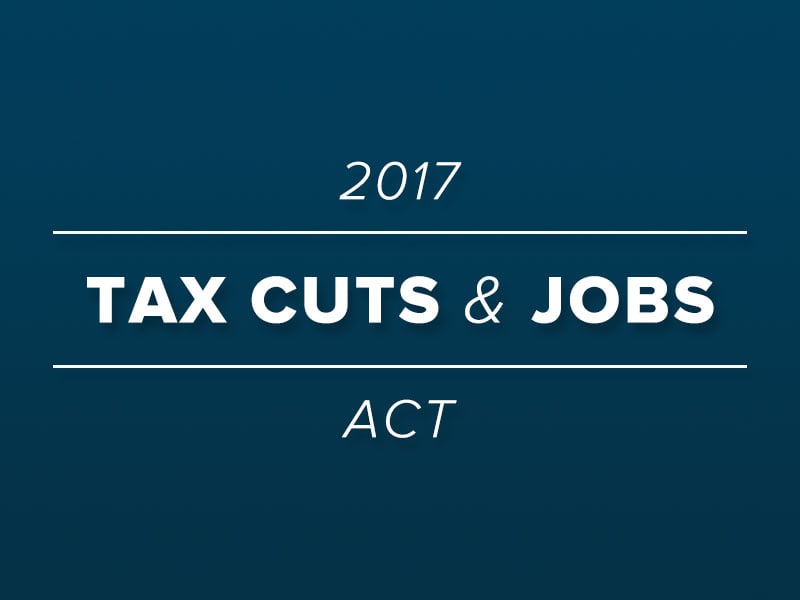Tax season is now in full swing, and as business owners, we’re about to see the real bottom line impact of the Tax Cuts and Jobs Act.
Signed in December 2017 by the Trump administration and now in full effect for the 2018 tax year, this controversial overhaul of the tax code has business owners nationwide wondering exactly what their tax bill is going to look like this year.
That’s why, to help you clear up the confusion and minimize your tax burden, we’ve put together a series on “Making the Tax Cuts and Jobs Act Work for YOUR Business”.
You see, we know that for most business owners, tax laws are generally as clear as mud and as exciting as a family reunion.
Tax law changes tend to make the confusion even worse, and bring up sleep-depriving questions like:
- What changes do I need to make to my business and personal tax strategy?
- How do I avoid overpaying on taxes?
- Will this impact my tax bill in April?
If you’re asking any of these questions, you’re not alone. In this series, we’re going to help you take advantage of the new tax laws, and charge confidently through tax season.
What’s Going On Here?
Quickbooks Payroll surveyed 600 small business owners throughout the U.S at the end of 2018 to find out what they think of the new tax laws.
In this series, we’ll take a quick look at specific survey results and show you how to navigate past any bad information that’s currently circulating throughout the financial world.
SURVEY: 43% of business owners believe that IRS guidelines are NOT created with small businesses in mind.
REALITY: Yes and no. First of all, the majority of tax breaks written into the tax code benefit business owners and investors. This makes sense since the government wants to incentivize behavior that grows the economy and creates jobs.
The problem is, many of the deductions for small business owners have been changed or reduced or even dropped. These changes are buried inside 70,000 pages of confusing jargon that most small business owners have no time to wade through. That’s why every business owner needs a qualified and educated advocate to avoid giving a massive annual tip to Uncle Sam.
SURVEY: 32% of the respondents said the 2017 Tax Cuts and Jobs Act is good for business, while 19% said it was bad for business.
REALITY: As mentioned, the tax code’s purpose is to incentivize activities that benefit the economy. That means every business owner is permitted to minimize their tax burden by following the rules.
There are several changes in the new law that will take away “pet deductions” many CPAs and business owners have used over the years. However, there are also several new provisions that business owners can use to their advantage. With the help of a great financial team, the Tax Cuts and Jobs Act can be very good for your business.
At the end of this article, we have some free resources to help you get the most out of your tax preparation and pay the least amount of tax.
SURVEY: The majority of business owners surveyed agreed the new tax law will boost profit and investment and reduce tax but respondents were, in comparison, less likely to say it will create jobs or increase pay.
REALITY: There’s a lot to clarify still, and the majority of accountants will likely rely on IRS news releases or summarized data rather than scouring every inch of the new tax law. They’ll say they’re taking a “conservative approach” to avoid raising any red flags. This so-called “safe” approach could make you miss out on tax savings that are rightfully yours.
We’re not advocating doing anything illegal, of course. There’s a huge difference between knowing the tax laws better than the IRS auditors and using them to your advantage, rather than hiding laziness behind the excuse of “safety” or being “conservative.”
You’ve worked hard for your money. You deserve the best advice on saving taxes. So always seek out a tax professional (or better yet a tax team) who uses strong research to make sure you get the biggest tax savings possible.
So what’s the truth? Is the new tax law good OR bad for your business?
Will your 2019 tax bill be bigger or smaller than before?
4 Situations Where You Could “Lose” and Pay More on Taxes This Year
#1: Business Owners in High-Tax States
A CBS news article warned that people living in high-tax states may end up owing more in taxes this year due to the new cap on the state and local tax deduction at $10,000.
For instance, residents of New York State will pay an additional $14.3 billion in taxes in 2018.
#2: New Homeowners with Large Mortgages
Interest on mortgages above $750,000 that were originated after December 15, 2017, are no longer deductible in the new IRS guidelines.
Before the Tax Cuts and Jobs Act (TCJA) you could deduct interest on up to $1 million of home mortgage debt, or $500,000 if you’re married filing separately.
#3: High-Earning Self-Employed Taxpayers
If you’re self-employed, any earnings under $315,000 (married filing jointly) or $157,500 (for all other taxpayers), will be eligible for the much talked about 20% “Qualified Business Income Deduction.”
However, above these thresholds, the deduction begins to phase out until a maximum taxable income of $415,000 (married) or $207,500 (everyone else) – which means as a high-earner, you’ll still get some benefit – just not on all your income.
This applies if you’re a “Specified Service Trade or Business.” However, this is one area that still has some vague points and unanswered questions. You’ll want a great financial team to help you structure your business properly to minimize your taxes.
Our team of tax experts and cash flow strategists saves the average business owner $2,484 per month from “cash flow leaks” and by fixing tax inefficiencies. Click here to see if working with our team of “money nerds” could be right for you.
#4: Business Owners with “Conservative” (lazy) Accountants
We believe that tax strategy is one of the easiest ways to recover cash flow if you can find a production-minded accountant.
To us, the word “conservative” can be translated to “lazy” or even “out of date.”
If you were able to take any tax deduction legally, why wouldn’t you? Is it conservative to overpay on your taxes?
There’s a better way.
How to Minimize Your Tax Burden This Year
Prior to the new tax act, our internal Wealth Factory survey found that on average, 93% of small business owners surveyed needlessly overpay an average of $11,283 per year in excess taxes.
In the past, we’ve written about how the new tax law might save you money, but there’s also a real possibility it could RAISE your taxes instead… especially if you’re earning more than $250k per year in personal income.
We’ve also outlined 5 big wins from the tax reform bill that small business owners can take advantage of.
But the bottom line is this:
In order to minimize your tax burden this year and put saved tax-dollars straight to your bottom line, you must have a financial team that can cater the available strategies to YOUR business.
To help you get started on making this your best tax-year yet, we’ve put together a comprehensive guide to minimizing your tax burden and taking advantage of the new Tax Cuts and Jobs Act.
We call it the “Ultimate 2019 Tax Savings Guide”, and you can download it free, right here.
The new Tax Cuts and Jobs Act can be good for your business…
But exactly how good or how bad is up to you, and it falls squarely on the head of your tax team.
The winners of the 2019 tax game will be small business owners with “production-minded” CPAs who understand their client’s business and are able to apply the new tax law for maximum benefit.
Your Action Plan:
- Download your free “Ultimate 2019 Tax Savings Guide” here.
- Read through it, and identify the top 1-3 strategies that could work for you this year and discuss them with your tax team or CPA. Watch for signs of reluctance (lack of knowledge) and confidence (knowledgeable) about using the new tax laws to your full advantage.
- Check out Garrett’s recorded call here on “How to Pick a World-Class Tax Professional (or Rate Your Existing CPA). You need a tax advocate for your business, and the first step is to assess your existing team.
- Work with your tax team to cater the available strategies to YOUR business.
Reducing your tax liability can be one of the quickest and easiest ways to instantly inject new cash flow into your life.
That’s why it’s one of the first things we handle when helping our clients with their personalized Financial Blueprint in our high-level FastTrack program.
The next step is to get them plugged into our own world-class network of financial professionals — the same team that personally handles Garrett’s finances.
And the full team isn’t just for taxes. It includes a comprehensive financial team that works together on your behalf covering every aspect of your financial life, from asset protection to insurance optimization to estate planning to cash flow optimization… and even includes a Registered Investment Advisor.
If that sounds like something you’d be interested in…
That’s it for this week.
Build the life you love,
The Builders at Wealth Factory


